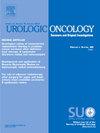Total extra-peritoneal approach to radical cystectomy with ureterostomy: A novel technique for the elderly and frail
IF 2.4
3区 医学
Q3 ONCOLOGY
Urologic Oncology-seminars and Original Investigations
Pub Date : 2024-10-24
DOI:10.1016/j.urolonc.2024.10.008
引用次数: 0
Abstract
Objectives
Radical cystectomy with urinary diversion is the gold standard treatment for bladder cancer (high-risk/muscle invasive). The transperitoneal approach is associated with significant gastrointestinal complications like ileus. In the elderly and frail with a single functional kidney, we describe an extraperitoneal technique of radical cystectomy, with a ureterostomy, to be performed without general anesthesia.
Materials and methods
The elderly, frail, and high-risk candidates for general anesthesia, with a prior history of nephroureterectomy with a second primary muscle-invasive bladder cancer, were chosen. All patients underwent the described procedure under combined spinal and epidural anesthesia. The posterior dissection was retrograde, caudal to cranial, with the peritoneum being opened only for resection of the dome. A cutaneous ureterostomy was fashioned on the side of the functional kidney. Peri-operative parameters were assessed for early recovery in this high-risk group.
Results
The mean age was 82 years (range: 73–91), with Charleson Comorbidity Index 5, and were all deemed unfit for neoadjuvant chemotherapy. With a median duration of 127.5 minutes, an average blood loss of 225ml, and no patient requiring general anesthesia; early ambulation, early return of bowel function, and a lesser hospital stay (7 days) with minimal morbidity were achieved. Negative surgical margins were achieved in all cases, with a mean harvest of 29 lymph nodes. Only 1 patient developed stomal stenosis. The cause-specific survival (CSS) is 100% at 2 years.
Conclusions
The highlighting features are the early return of bowel function (flatus passage on day 1) and the avoidance of the cardio-pulmonary complications of general anesthesia. The extraperitoneal cystectomy offers a promising alternative in this select group and warrants further studies to extrapolate this technique for bilateral urinary drainage.
全腹膜外法根治性膀胱切除术加输尿管造口术:适用于年老体弱者的新技术。
目的:根治性膀胱切除术加尿路改道是治疗膀胱癌(高危/肌浸润性)的金标准。经腹膜方法会引起严重的胃肠道并发症,如回肠梗阻。对于年老体弱且只有一个功能性肾脏的患者,我们描述了一种腹膜外膀胱根治性切除术技术,该技术带有输尿管造口术,无需全身麻醉:我们选择了年老体弱、需要全身麻醉的高危患者,他们都曾接受过肾切除术,并患有第二种原发性肌肉浸润性膀胱癌。所有患者都在脊髓和硬膜外联合麻醉下接受了所述手术。后方解剖是逆行的,从尾部到头颅,腹膜只在切除穹隆时打开。在有功能的肾脏一侧做了皮下输尿管造口术。对这组高风险患者的围手术期参数进行了评估,以确定其能否早日康复:患者平均年龄为 82 岁(73-91 岁),查尔斯恩综合指数为 5,均不适合接受新辅助化疗。手术时间中位数为 127.5 分钟,平均失血量为 225 毫升,没有患者需要全身麻醉;手术后患者可以早期下床活动,早期恢复肠道功能,住院时间较短(7 天),发病率极低。所有病例的手术切缘均为阴性,平均切除 29 个淋巴结。只有一名患者出现了口腔狭窄。2年的病因特异性生存率(CSS)为100%:结论:腹膜外膀胱术的突出特点是肠道功能恢复早(第1天即可排便),且避免了全身麻醉带来的心肺并发症。腹膜外膀胱切除术为这部分患者提供了一种很有前景的选择,值得进一步研究,以便将这种技术推广到双侧尿液引流术中。
本文章由计算机程序翻译,如有差异,请以英文原文为准。
求助全文
约1分钟内获得全文
求助全文
来源期刊
CiteScore
4.80
自引率
3.70%
发文量
297
审稿时长
7.6 weeks
期刊介绍:
Urologic Oncology: Seminars and Original Investigations is the official journal of the Society of Urologic Oncology. The journal publishes practical, timely, and relevant clinical and basic science research articles which address any aspect of urologic oncology. Each issue comprises original research, news and topics, survey articles providing short commentaries on other important articles in the urologic oncology literature, and reviews including an in-depth Seminar examining a specific clinical dilemma. The journal periodically publishes supplement issues devoted to areas of current interest to the urologic oncology community. Articles published are of interest to researchers and the clinicians involved in the practice of urologic oncology including urologists, oncologists, and radiologists.

 求助内容:
求助内容: 应助结果提醒方式:
应助结果提醒方式:


